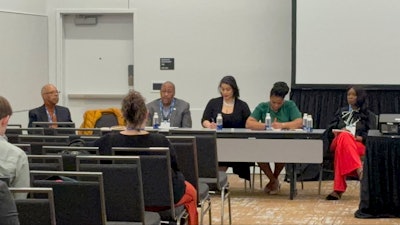SEATTLE — Prominent student affairs practitioners of color shared powerful stories of leading in higher education amid major challenges, including the recent COVID pandemic and ongoing attacks to diversity, equity, and inclusion initiatives.
"Navigating the Opportunities in Uncertainty: Stories of Diverse Student Affairs Professionals Across the Career Span," was among the dozens of panels held on Sunday during the opening day of the NASPA annual conference--the nation's largest gathering of student affairs professionals. The panel was organized by the Melvin C. Terrell Educational Foundation, a nonprofit committed to supporting the next generation of practitioners and was moderated by Dr. Terrell L. Strayhorn, vice provost and interim dean of the School of Arts & Sciences at Virginia Union University.
 Drs. Melvin C. Terrell, Martino Harmon, D'Andra Mull, Shawna Patterson-Stephens, Melissa Shivers participate in a panel at NASPA that was moderated by Dr. Terrell L. Strayhorn.
Drs. Melvin C. Terrell, Martino Harmon, D'Andra Mull, Shawna Patterson-Stephens, Melissa Shivers participate in a panel at NASPA that was moderated by Dr. Terrell L. Strayhorn.
The politicization of higher education has increasingly made the task of serving students more difficult in recent years, the panelists noted.
"Higher education has forgotten its why," said Dr. D'Andra Mull, vice chancellor for student affairs at the University of Colorado Boulder, who reminded practitioners to ensure that their values are in alignment with the institution where they serve.
"Bloom where you are planted, but go where you can grow," said Mull, who urged professionals to figure out what they want to learn before making the leap to another job. "It might be your time, but not your door," she added.
Student affairs professionals, like faculty at many colleges and universities, are increasingly subjected to outside interference by state and federal legislators who have in some places, made it more difficult to promote diversity and inclusion.
"Higher education has become incredibly challenging," said Dr. Melissa Shivers, senior vice president for student life at The Ohio State University (OSU). "You were hired to do one thing, and then a law is passed that can change that, so working in higher education has become taxing."
As such, Shivers said, it's important that student affairs professionals practice self-care.
"Our mental-health and well-being is just as important as the learners who get to work with every day," said Shivers, who was in her job at OSU for only two and a half months when the pandemic shut down colleges and universities across the world. "I think about how I felt personally and professionally during the pandemic at a new institution and the importance of empowering and supporting people." During those trying times, Shivers said that she learned the value of being able to communicate clearly.
"It was important for people to be able to hear from senior leadership about what was happening every day," she said.
Dr. Martino Harmon, vice president for student life, recalled the tensions that erupted across the nation during the 2016 and 2020 presidential elections, when first amendment issues took center stage. In the wake of such "polarizing times", Harmon said that college leaders must cling to shared values and not entertain divisive politics that are "ripping at the core of what we do and who we are."
NASPA, he said, provides an opportunity to connect with other colleagues and to think about best practices that are making a difference.
"The challenges should inspire our dedication and commitment to the work that we're doing and how we can make connections with others in this space, doing this same work so that we can maximize our efforts."
Michael Weaver, associate director of donor and external relations at the University of Texas at Austin said that he was encouraged by what he heard during the 90-minute panel.
"It's inspiring to see ourselves in senior leadership roles at these institutions," said Weaver, a board member of the Foundation. "To hear about their journey and their stories, including the adversity that they faced, gives me hope and helps me realize that there is light at the end of the tunnel. and to keep pressing forward."
Terrell, who is vice president emeritus at Northeastern Illinois University, said that he appreciates the ongoing efforts to make higher education accessible to all. He paid homage to the late Dr. Theresa Powell, a veteran student affairs leader and member of the Foundation's board, who passed away last year. He said that Powell "embraced compassion and restoration and was not afraid to share it without reserve." He said that he sees that kind of passion in the next generation of student affairs leaders like Harmon, Mull, Patterson-Stephens and Shivers.
"I am very, very encouraged about the future because we have future leaders who understand the importance of enhancing and improving higher education with our knowledge and our skills."















